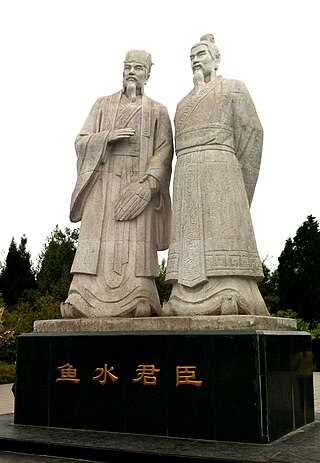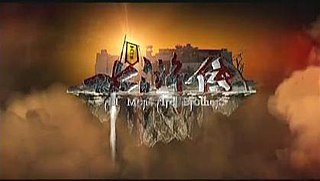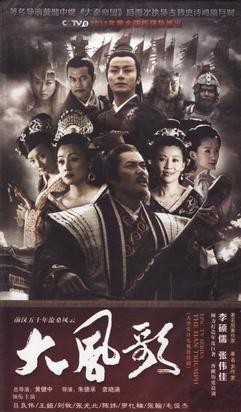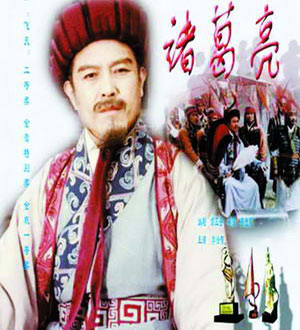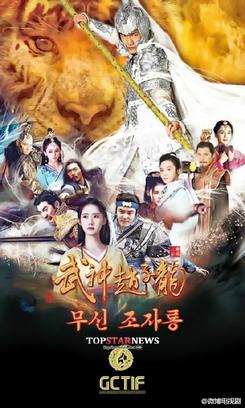| # | English title | Original title |
|---|
| 1 | To eliminate a traitor, Cao Cao presents a precious sword | 除国贼曹公献宝刀 |
| 2 | Chen Gong releases Cao Cao in righteousness | 陈宫申正义释曹操 |
| 3 | Cao Cao kills Lü Boshe by mistake | 曹操疑错杀吕伯奢 |
| 4 | Guan Yu slays Hua Xiong while the wine is still warm | 关云长温酒斩华雄 |
| 5 | Battle of Hulao - The three heroes fight Lü Bu | 破虎牢三英战吕布 |
| 6 | Sun Jian gains the Imperial Jade Seal | 孙坚得传国玉玺 |
| 7 | Sun Jian's death at Sanjin Ford | 三津渡孙文台殒命 |
| 8 | Wang Yun plans the Chain-Linked Strategy | 王司徒巧设连环计 |
| 9 | Father and son turn hostile at Fengyi Pavilion | 凤仪亭父子挑兵戈 |
| 10 | Lü Bu kills Dong Zhuo | 反间计吕布诛董卓 |
| 11 | Tao Qian offers Xu Province thrice | 陶恭祖三让徐州城 |
| 12 | Lü Bu is defeated in battle and seeks shelter under Liu Bei | 吕奉先战败投刘备 |
| 13 | Cao Cao saves the emperor and controls the warlords | 曹孟德救驾令诸侯 |
| 14 | Lü Bu stages a night raid on Xu Province | 吕奉先趁夜袭徐郡 |
| 15 | Lü Bu shoots an arrow through a halberd | 吕奉先辕门射画戟 |
| 16 | Cao Cao defeats Yuan Shu in battle | 曹孟德举兵败袁术 |
| 17 | Lü Bu falls for Cao Cao's trick and loses Xu Province | 中曹计吕布失徐州 |
| 18 | Lü Bu meets his end at White Gate Tower | 白门楼奉先赴黄泉 |
| 19 | Liu Bei receives an imperial decree and swears to destroy Cao Cao | 刘皇叔奉旨誓灭曹 |
| 20 | Cao Cao discusses about heroes over drinks | 曹孟德煮酒论英雄 |
| 21 | Yuan Shao and Cao Cao mobilise their armies | 袁曹各起马步三军 |
| 22 | Liu Bei is defeated and seeks shelter under Yuan Shao | 刘玄德战败投袁绍 |
| 23 | Guan Yu surrenders to Cao Cao on three conditions | 关云长降曹约三事 |
| 24 | Yuan Shao loses troops and commanders | 袁本初败兵又折将 |
| 25 | Guan Yu's lone journey over a thousand li | 美髯公千里走单骑 |
| 26 | Reunion at Gucheng | 会古城主臣聚大义 |
| 27 | Yuan Shao suffers defeats at Guandu | 战官渡袁本初败绩 |
| 28 | Xu You betrays his lord and joins Cao Cao | 许子远叛主投曹操 |
| 29 | Cao Cao burns the supply depot at Wuchao | 曹孟德劫粮烧乌巢 |
| 30 | Liu Bei garrisons an army at Xinye | 刘备屯兵新野 |
| 31 | Liu Bei's horse leaps across the Tan Stream | 刘皇叔跃马过檀溪 |
| 32 | Xu Shu turns back to recommend Zhuge Liang to Liu Bei | 徐元直走马荐诸葛 |
| 33 | Liu Bei visits Zhuge Liang thrice | 刘玄德三顾请诸葛 |
| 34 | Sun Ce passes on his legacy to Sun Quan | 孙策传位孙权 |
| 35 | Zhuge Liang deploys troops at an early stage | 诸葛亮初用兵 |
| 36 | Zhao Yun fights at Changban | 赵子龙血战长坂坡 |
| 37 | Zhuge Liang argues with the scholars | 诸葛孔明舌战群儒 |
| 38 | Zhuge Liang instigates Zhou Yu to resist Cao Cao | 抗曹操孔明激周瑜 |
| 39 | Jiang Gan steals a letter after a ceremony | 群英会蒋子翼盗书 |
| 40 | Zhuge Liang borrows arrows with straw boats | 诸葛孔明草船借箭 |
| 41 | Zhou Yu defeats Cao Cao at Red Cliff | 周公瑾赤壁破曹操 |
| 42 | Guan Yu spares Cao Cao at Huarong Trail | 关云长华容放曹操 |
| 43 | Sima Yi serves Cao Cao | 司马懿出山助曹操 |
| 44 | Cao Cao scares away Ma Teng of Western Liang | 曹操吓退西凉马腾 |
| 45 | Cao Cao loses his beloved son Cao Chong | 曹操痛失爱子曹冲 |
| 46 | Zhou Yu prepares to attack Jing Province | 夺荆州周公瑾发兵 |
| 47 | The forces of Cao, Sun and Liu battle for Nan Commandery | 曹孙刘三军战南郡 |
| 48 | Zhou Yu returns to Chaisang in unhappiness | 周公瑾赌气归柴桑 |
| 49 | Zhao Yun captures Guiyang | 赵子龙计取桂阳城 |
| 50 | Guan Yu fights at Changsha and recruits Huang Zhong and Wei Yan | 战长沙关羽收黄魏 |
| 51 | Lu Su comes twice to ask for Jing Province | 鲁子敬二度索荆州 |
| 52 | Liu Bei travels to Wu for a marriage | 刘备赴吴娶亲 |
| 53 | Sun Quan is angered by Zhou Yu | 孙权被周瑜激怒 |
| 54 | Lady Sun and Liu Bei are wed | 孙小妹刘备成亲 |
| 55 | Liu Bei returns to Jing Province | 刘备智返荆州 |
| 56 | Zhuge Liang infuriates Zhou Yu thrice | 诸葛亮三气周瑜 |
| 57 | Zhou Yu is defeated and dies with regret | 周瑜兵败抱憾而亡 |
| 58 | Zhuge Liang mourns Zhou Yu | 诸葛亮痛哭祭周瑜 |
| 59 | Cao Cao hosts a banquet at the Bronze Sparrow Platform | 曹操大宴铜雀台 |
| 60 | Ma Teng enters the capital | 西凉统领马腾进京 |
| 61 | Ma Teng is killed after falling into an ambush | 马腾中埋伏被杀 |
| 62 | Xu Chu fights Ma Chao | 许褚斗马超 |
| 63 | Zhang Song is humiliated but is later well received by Liu Bei | 张松受辱刘备相迎 |
| 64 | Zhang Song presents a map; Liu Bei enters southwest China | 张松献图玄德入川 |
| 65 | Wei Yan performs a sword dance, his target is Liu Zhang | 魏延舞剑意在刘璋 |
| 66 | Pang Tong's demise at Fallen Phoenix Slope | 庞统身死落凤坡 |
| 67 | Ma Chao pledges allegiance to Liu Bei | 马超誓效刘皇叔 |
| 68 | Guan Yu attends a feast alone and armed with only a blade | 关云长单刀赴会 |
| 69 | Huang Zhong conquers Hanzhong | 黄忠攻破汉中 |
| 70 | Cao Cao executes Yang Xiu at Mount Dingjun | 定军山曹操杀杨修 |
| 71 | Guan Yu's poison arrow wound is cured | 关羽刮骨疗毒 |
| 72 | Guan Yu commits suicide at Maicheng | 关羽麦城悲壮自刎 |
| 73 | Cao Cao's final wish and death | 传遗命曹操气数终 |
| 74 | Cao Pi forces Cao Zhi to compose the Seven Steps Poem | 兄逼弟曹植七步诗 |
| 75 | Emperor Xian receives two imperial edicts and abdicates in Cao Pi's favour | 汉献帝两诏禅曹丕 |
| 76 | Emperor Xian commits suicide; Liu Bei establishes Shu | 献帝自杀刘备建蜀 |
| 77 | Zhang Fei dies in his eagerness to avenge his brother | 急兄仇张翼德殒命 |
| 78 | Liu Bei launches a campaign against Eastern Wu | 刘玄德兴兵征东吴 |
| 79 | Sun Quan submits to Wei | 孙权降魏 |
| 80 | Huang Zhong is killed in battle | 黄忠战死 |
| 81 | Lu Xun sets aflame Liu Bei's linked camps over 700 li | 陆伯言营烧七百里 |
| 82 | Liu Bei entrusts his son at Baidicheng | 刘先主白帝城托孤 |
| 83 | Zhuge Liang calmly holds off five enemy forces | 诸葛亮安居平五路 |
| 84 | Zhuge Liang writes the Chu Shi Biao | 诸葛拟出师表 |
| 85 | Zhuge Liang prepares for the Northern Campaigns | 诸葛亮北伐大兴师 |
| 86 | Ma Su refuses to accept advice and loses Jieting | 马幼常拒谏失街亭 |
| 87 | Zhuge Liang's Empty Fort Strategy backs off Sima Yi's troops | 诸葛孔明空城退敌 |
| 88 | Zhao Yun bids the world farewell | 赵云辞世 |
| 89 | Zhuge Liang defeats Sima Yi | 诸葛亮大破司马懿 |
| 90 | Zhuge Liang eliminates Cao Zhen with a wise plan | 诸葛亮妙计除曹真 |
| 91 | Zhuge Liang takes Chencang by strategy | 诸葛亮计破陈仓城 |
| 92 | Zhuge Liang sends a letter to ridicule Sima Yi | 诸葛孔明下书辱司马 |
| 93 | Sima Yi is saved by a downpour at Shangfang Valley | 上方谷大雨救司马 |
| 94 | The chancellor's death at Wuzhang Plains | 五丈原汉丞相归天 |
| 95 | Sima Yi fakes illness and takes control of Wei | 司马懿诈病掌朝政 |

